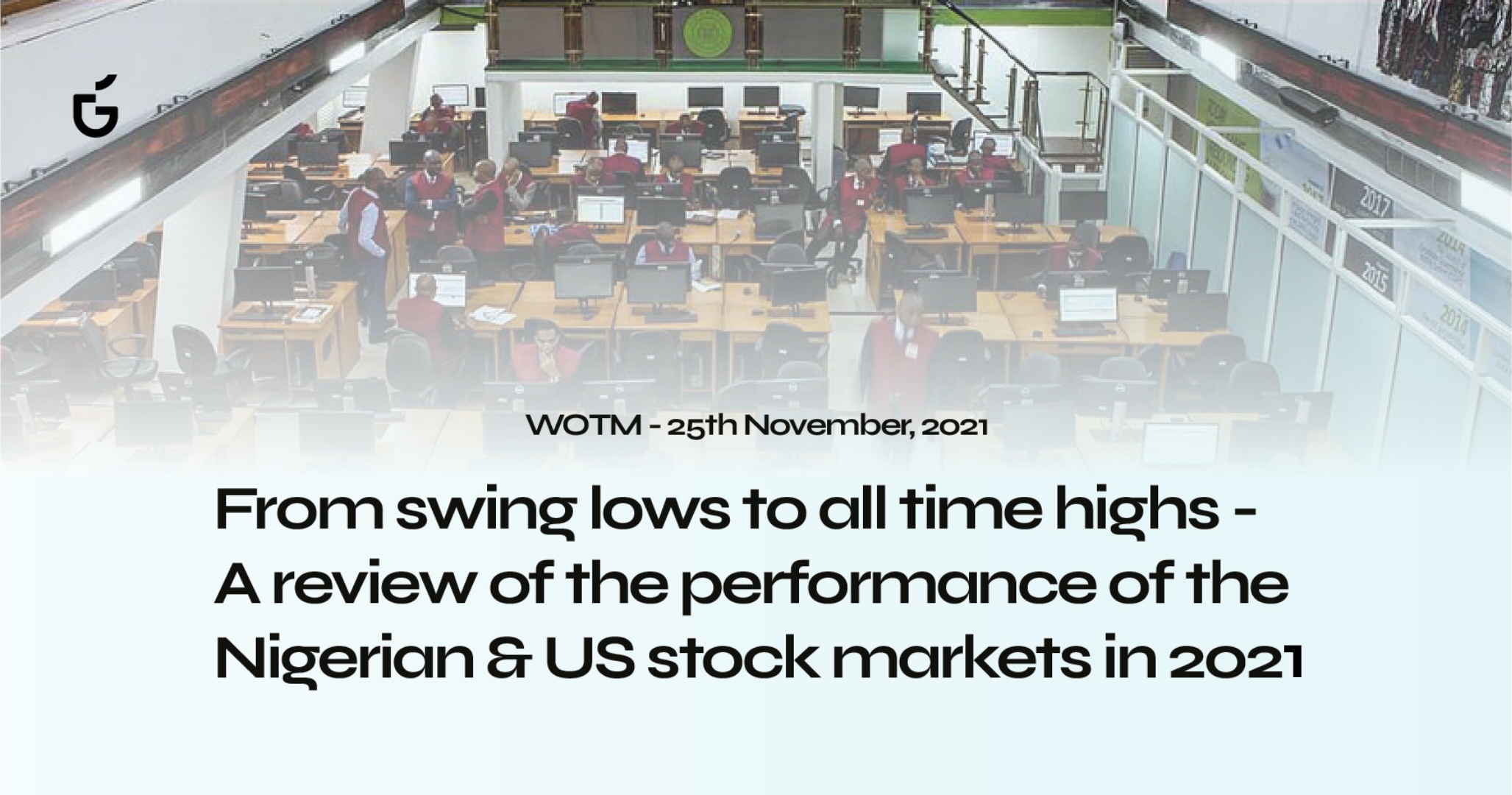 Africa
AfricaUnderstanding how companies are valued – A look into the MainOne acquisition
15 December, 2021
06 May, 2021 | 4 MINS READ
Three Stories this week
The Nigerian National Petroleum Corporation (NNPC) in the past week announced it will not be remitting money to the Federal Accounts Allocation Committee (FAAC) in May 2021. The government agency in a letter addressed to the accountant general of the federation noted that N111.96bn will be deducted from oil and gas proceeds for the month of April to ensure the continuous supply of petroleum products to the nation to guarantee energy security.
In the same week, the Central Bank of Nigeria (CBN) dismissed the board of directors of First Bank of Nigeria (FBN) Holdings. This was done after the bank’s board of directors on Wednesday the 28th of April 2021 announced the appointment of Gbenga Shobo as the new Managing Director/Chief Executive Officer of the bank. The CBN queried the board for appointing Mr Shobo without its approval and before the expiration of the incumbent CEO’s tenure. The apex bank went further to appoint a new board of directors and reinstated Mr Sola Adeduntan as the Managing Director of the bank.
The cryptocurrency market in its volatile fashion returned to an uptrend in the past week. Ethereum (the world’s second largest cryptocurrency by market capitalization) reached an all-time high of $2,796 in the week. Bitcoin also received some attention, moving from a low of $47,060 at the beginning of the week to $57,192 at the end of the week.
A Subsidy Conversation
Since the oil boom of 1970s, Nigeria has depended on its earnings from oil as its major source of revenue. The NNPC is the establishment charged with the responsibility of refining, transporting, and marketing petroleum products in Nigeria. NNPC’s responsibilities puts the agency in charge of accepting and remitting oil proceeds to the federation account. There have always been allegations of NNPC’s failure to remit oil revenue to the government, but this is a different story. The NNPC has stated clearly that it will not be able to remit oil revenue into the federation account due to payment for oil subsidy.
Oil subsidy in Nigeria dates back to the 1980s when the NNPC wanted to unify the local price of crude oil to reflect the price in the global market, the government at the time was of the opinion that Nigerians will not be able to bear the increase in price of petroleum products that would come with the unification, so subsidy was introduced to cushion the effect unification of crude oil prices would have on Nigerians. The size of petroleum subsidy in Nigeria has ballooned over the years and given Nigeria’s foreign exchange crisis and fluctuating revenue, it has become unaffordable for the government. Nigerians have however come to see petroleum subsidy as the only benefit they get from the government and have been very resistant to attempts to stop subsiding oil products.
2020, the year of the pandemic, hit the Nigerian economy hard. Recession, skyrocketing inflation, dwindling foreign exchange earnings, unemployment and declining government revenue was the order of the day. The effect of the pandemic on oil prices and government revenue forced the Buhari-led administration to remove subsidy from petroleum products in 2020. It was easy to do this at the time as oil prices were at record low levels. Removing oil subsidy meant petroleum prices in Nigeria will reflect the prices in the global market.
But as economies activities started to pick up around the world and oil prices started to rise, the government was forced to reintroduce a staggered form of subsidy to petroleum products. Whenever oil prices are below $50 in the international market, subsidy is removed and when oil prices go above $60 subsidy is placed on oil in Nigeria. Oil prices have been above $60 all through 2021.
The NNPC coming out to state it will not be able to remit revenue into the federation account makes obvious the fact that government cannot afford to maintain subsidy on oil products. The N13.59trn approved budget for 2021 already has a deficit (the part of the budget that will be funded with borrowings) of N5.6trn, with the government insisting on maintaining a subsidy it cannot afford, budget deficit for 2021 will widen. The government will need to borrow more to support its revenue in 2021.
There is nothing wrong with borrowing to fund government spending as long as the monies borrowed is put into activities that will boost government revenue and help pay back the debt. Unfortunately, history shows this is not the case in Nigeria, monies borrowed will go into funding recurrent expenditure and private pockets. We believe the government will maintain subsidy payment until after the general elections in 2023. The debt burden will be passed on to the incoming government in 2023.
We also believe the government might do more of local debt given its challenges with foreign exchange. This implies rates on government securities like treasury bills and FGN Bonds will trend higher, giving investors an opportunity to return to the fixed income market after a long period of depressed rates.
The Board Room Shake Up
FBN Holdings is a tier-1 bank (one of the strongest banks in terms of capital), as at full year 2020 it had total assets worth N7.7trn, this makes the bank the second largest bank in Nigeria in terms of assets. Its position in the financial sector of Nigeria means its failure poses systemic risk to the finance industry and the economy. Regulators pay keen attention to the activities of “too big to fail” institutions like FBN Holdings and expect that they consistently act in the best interest of all stakeholders. In 2015, FBN Holdings recorded a 97% decline in profit, this was due to the 385% rise in provisions for non-performing loans in the period. FBN Holdings loan portfolio was at the time 86% of non-performing loans, most of which were loans to oil & gas companies. 2015 recorded significant decline in oil prices, so most of these companies struggled with the repayment of their loans. The effect of this on the bank’s capital and loan book drew the attention of the CBN. The CBN stepped into the situation by supervising the appointment of a new Managing Director and gave forbearance to write off the loans and restructure loans given to insiders. This explains the CBN’s reaction to the board removing the Managing Director who they believed helped the bank recover from a bad position.
The board of directors oversees the implementation of corporate governance policies and poor corporate governance puts companies in situations like the one FBN Holdings found itself in 2015/2016. Oando has also been dealing with corporate governance issues. Two of Oando’s shareholders petitioned the Securities and Exchange Commission (SEC) on issues of financial misappropriation in 2017, after some investigations, SEC in 2019 indicted the Group Chief Executive Officer, CEO, of Oando Plc, Mr. Wale Tinubu, and Deputy GCEO, Omamofe Boyo, of misconduct in conducting the affairs of the company and barred them from holding the position of director in any public company for a period of five years.
The company’s board of directors were also asked to resign. The company reacted to this by getting a court injunction to overrule SEC’s instructions and the matter has been in court since 2019.
Corporate governance is very important to the success of any organization, the right corporate governance shows a company’s direction and business integrity. A company with integrity at its core earns investors trust and is seen as being financially viable.
Paying attention to companies’ corporate governance policies and those in management is important to successfully invest in the stock market.
The Apparent Recovery of the Crypto Market
After 2 weeks of a decline, the cryptocurrency market returned to an uptrend in the past week. The rejuvenation of the market was led by Ethereum. Ethereum is the second largest cryptocurrency in the world in terms of market capitalization. It was reported last week that the European Investment Bank (EIB) which is the investment arm of the European Union (EU) sold $121 million worth of digital bonds on the Ethereum blockchain. The decision of the EIB to use the enterprise-grade functionality of Ethereum was seen by many as a stamp of approval for the network. This report saw Ethereum rise to a high of $2,796.
The rise is also attributed to the proposed upgrades expect to mend some of the defects associated to the network. One of the upgrades, EIP-1559 is going to reduce the overall supply of Ethereum thereby push up its price, another (Ethereum 2.0) is expected to offer lower transaction cost on the Ethereum network. Ethereum as at the time of writing is priced at $3,379.
Ethereum seems to be taking the shine away from Bitcoin. Bitcoin in the past week did not rise as fast as Ethereum, while Ethereum rose by 36% in the past week, Bitcoin was up by 28%, the reverse used to be the case. Ethereum’s blockchain has more functionalities than that of Bitcoin. While Bitcoin serves more as a store of value, Ethereum allows for issuance of contracts and host decentralized applications like NFTs (Non-Fungible Tokens) and DeFi (Decentralized Finance).
Like we noted in our last Word on the Market, the cryptocurrency market is still emerging, innovation will bring about new cryptocurrency based financial products that will increase the use and acceptability of cryptocurrencies.
Again, cryptocurrencies are still very volatile, understand your ability and willingness to take risk before investing in them.
 Africa
Africa15 December, 2021
 Africa
Africa09 December, 2021
Join the biggest
investment club in Nigeria.